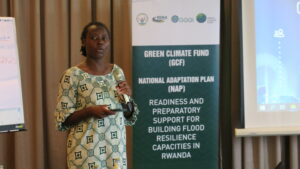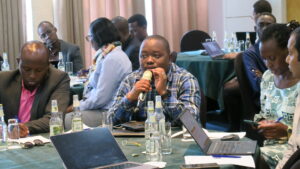25th January, Kigali Rwanda, GGGI in collaboration with Rwanda Environment Management Authority (REMA) organized and held the hybrid Closing Workshop for the GCF National Adaptation Readiness & Preparatory Support for Building Flood Resilience Capacity in Rwanda (GCF NAP Readiness Project), with several participants representing numerous project stakeholders such as
Ministries: MoE, MININFRA, MINEMA, MINALOC, MINAGRI, MINECOFIN, MINICOM, MIGEPROF ;
Institutions: REMA, RWB, Meteo Rwanda, RTDA, RHA, LODA, GMO, FONERWA, RDB, PSF, NIRDA-CPCIC, NLA, WASAC, REG ;
Development Partners: World Bank, NDF, ENABEL, ICLEI, Water for Growth, IWRM, IUCN ;
Sub-National Entities: City of Kigali, Secondary Cities, Districts ;
Research Institutions, Professionals: UR, RAPEP, RIA, IER, RUPI ;NGO’s/CBO’s/CSO’s: RISD, Rwanda Women Network, RENGOF, Arcos Network, CGIAR, HoReCo, RYWP, The Green Protector
GCF NAP Readiness and Preparatory Support for Building Flood Resilience Capacities in Rwanda is undergoing rapid urbanization as one of its main economic growth and transformation drivers, while risks from climate change continue to pose a challenge. Although there have been past and on-going interventions in the area of building climate resilience and adaptation, limited, if any, activities focus on interventions related to urban and the built environment. It is in the above context that the National Designated Authority (NDA) i.e., Rwanda Environment Management Authority (REMA) and the Accredited Entity (AE) i.e., Ministry of Environment (MoE) of Rwanda to the Green Climate Fund (GCF) in July 2018 nominated the Global Green Growth Institute (GGGI) to serve as the Delivery Partner (DP) in developing a proposal on National Adaptation Readiness and Preparatory Support for Building Flood Resilience Capacity in Rwanda(hereinafter referred to GCF NAP Readiness).

Mr Dheeraj Arrabothu representing GGGI Rwanda welcomed all the participants encouraging all to actively participate in the discussion , followed by Director of Advocacy ,REMA Ms Rachel Tushabe gave the opening remarks applauding all the project team members for their commitment and efforts in the project delivery mechanism that has been inclusive, transparent and effective in putting forward the necessary actions for the next phase of the program.
Liliane Uwanziga Mupende GCF NAP Project Lead-GGGI, gave a detailed presentation of the all completed project activities , next steps and recommendations. She outlined the background and context of the GCF NAP Readiness proposal development that went through a robust consultative process through engagement of stakeholders both at the sector and ministry levels. Furthermore she elaborated on all project activities under the 4 outcomes :
Outcome 1: Capacity and coordination strengthened for main institutions to effectively mitigate floods and prevent landslides.
Outcome 2: Appropriate technical studies identified and prioritized, climate finance strategies and project pipeline strengthened for effective storm water and landslide management in Kigali City and urban areas experiencing rapid growth and highly vulnerable to floods and landslides outside Kigali city.
Outcome 3: Knowledge management, information sharing, and communications strengthened to effectively mitigate floods and prevent landslides.
Outcome 4: Mechanisms for Reporting, Monitoring and Review of adaptation and resilience planning progress developed to gather lessons and integrate them into future iterations of the identified flood mitigation and landslide management planning process.

She concluded that the GCF NAP Project development went through a robust consultative process through engagement of stakeholders both at sector & ministry levels that lead to 4 project outcomes on capacity building ;technical studies on flood mitigation & landslide management planning process and the project team has was able to gather lessons & integrate them into future iterations of the identified flood mitigation & landslide management process with reports & animations shared with the public. The project’s outcomes & outputs benefit the critical mass of society whose role is to implement government policies, strategies & projects on the ground. The overall results will lead to successful implementation of key national strategies & plans.